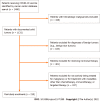Short term safety of coronavirus disease 2019 vaccines in patients with solid tumors receiving systemic therapy
- PMID: 36157156
- PMCID: PMC9346427
- DOI: 10.5306/wjco.v13.i7.599
Short term safety of coronavirus disease 2019 vaccines in patients with solid tumors receiving systemic therapy
Abstract
Background: There are currently three coronavirus disease 2019 (COVID-19) vaccines approved by the United States Food and Drug Administration to prevent coronavirus infection. However, robust data are unavailable on the adverse events of the vaccines in patients with solid tumor malignancies undergoing systemic therapies.
Aim: To evaluate the safety of COVID-19 vaccines in patients with solid tumors undergoing systemic therapies.
Methods: The study included patients with solid tumors treated in an academic tertiary care center who received COVID-19 vaccination between January 1, 2021 and August 15, 2021, while undergoing systemic therapy. Electronic medical records were accessed to collect information on patient characteristics, systemic therapies, type of vaccine received, and adverse effects associated with the vaccine administration. Adverse events (AEs) were graded according to Common Terminology Criteria for Adverse Events, version 5.0.
Results: The analysis included 210 patients; the median age was 70 years, and 51% of patients were female. The most common chemotherapy, immunotherapy, and targeted therapy administered were taxane-based regimens 14.2% (30/210), anti-programmed death 1 (PD-1) agents 22.8% (48/210), and antiangiogenic agents 7.1% (15/210), respectively. The most common cancers were gastrointestinal 43.8% (92/210), thoracic 30.4% (64/210), and genitourinary 17.6% (37/210). Patients received the following vaccines: 2 doses of BNT162b2 by Pfizer 52% (110/210), 2 doses of mRNA-1273 by Moderna 42% (89/210), and 1 dose of JNJ-78436735 by Johnson & Johnson 5% (11/210). At least 1 AE attributable to the vaccine was observed in 37 patients 17.6% (37/210). The total number of AEs attributable to vaccines was 62: Fifty-three grade 1 and nine grade 2. Most adverse events occurred after the second dose 59.7% (37/62). The most frequent grade 1 AEs included fatigue 17% (9/53), fever 15% (8/53), injection site reaction 13.2% (7/53), and chills 9.4% (5/53). The most frequent grade 2 AEs were fatigue 33.3% (3/9) and generalized weakness 22.2% (2/9). Therapy was delayed by 2 wk because of the AEs possibly related to vaccine administration in 3 patients 1.4% (3/210).
Conclusion: The present study demonstrates that the adverse events associated with COVID-19 vaccination are infrequent, mild, and rarely delay treatment in patients with solid tumors receiving systemic therapies.
Keywords: Adverse events; COVID-19; Chemotherapy; Immunotherapy; Solid tumor; Targeted therapy.
©The Author(s) 2022. Published by Baishideng Publishing Group Inc. All rights reserved.
Conflict of interest statement
Conflict-of-interest statement: Sakti Chakrabarti has received fees for serving as a speaker for Natera. Sakti Chakrabarti has received Honoraria from Haliodx and QED Therapeutics. Ronald Cox has no conflicts of interest. Marie Parish has no conflicts of interest. Carolyn Oxencis has no conflicts of interest. Bicky Thapa has no conflicts of interest. Edward McKenna has no conflicts of interest.
Figures
References
-
- Wiersinga WJ, Rhodes A, Cheng AC, Peacock SJ, Prescott HC. Pathophysiology, Transmission, Diagnosis, and Treatment of Coronavirus Disease 2019 (COVID-19): A Review. JAMA. 2020;324:782–793. - PubMed
LinkOut - more resources
Full Text Sources


